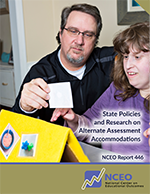Are we doing enough to support students with the most significant cognitive disabilities? A 2025 report from NCEO titled State Policies and Research on Alternate Assessment Accommodations explores this question. It sheds light on the current state of research and policy regarding accommodations for alternate assessments taken by students with the most significant cognitive disabilities. State assessment systems have included these students since 2000, but research on alternate assessment accommodations policies is lacking. Further, the clarity and consistency of accommodations policies remain varied across states.
The analysis found that 49 out of 51 states had publicly available documents detailing accommodations for alternate assessments, with most states (36) providing at least two such documents. Common accommodations included signed administration (48 states), magnification (46 states), assistive technology (46 states), manipulatives (43 states), human readers (44 states), and calculators (42 states). However, the terminology and organization of these policies differed widely, and information was often hard to locate or inconsistent within states.
Moreover, the literature review revealed that only six research studies on alternate assessment accommodations were published between 2000 and 2023, highlighting the need for more research in this area. The existing studies emphasized the importance of aligning instructional and assessment accommodations, preparing students to use accommodations effectively, and providing clear guidance on implementation.
This report underscores the necessity for states to adopt more consistent and transparent approaches to documenting and communicating accommodations policies. It also highlights the critical need for ongoing research to inform best practices and ensure that students with the most significant cognitive disabilities receive the support they need to succeed.
Check out the full report to read complete findings and recommendations.

